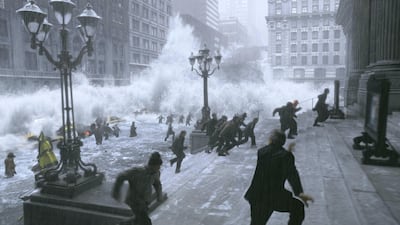The disaster movie genre is almost as old as cinema itself, with John Williamson's 1901 movie, Fire, a likely contender for the first-ever example of the genre. The sinking of the Titanic in 1912 inspired a wave of nautical disaster movies, including In Nacht und Eis (1912) and Atlantis (1913), which has continued to this day, with about 50 movies on the topic showing up on a quick Internet Movie Database Search, perhaps most notably James Cameron's 1997 multi-Oscar-nominated version. It was in the 1970s that the genre really came into its own, though, with 1970's Airport setting off a decade full of box-office-smashing and award-dominating movies such as The Poseidon Adventure (1972), The Towering Inferno (1974) and Juggernaut (1974). In homage to Geostorm, however, for our rundown of five disaster movies to check out, we're sticking strictly to natural disasters, so sinking ships and burning buildings are not on the list, neither are alien invasions, contagious viruses and zombie apocalypses. Instead, here's Mother Nature at her worst.
Earthquake (1974)
Valley of the Dolls director Mark Robson directs a dream team cast, featuring the likes of Charlton Heston, Ava Gardner, Victoria Principal and Walter Matthau, in this classic example of the genre in its 1970s heyday. Heston's philandering former footballer is forced to turn hero, while managing his own love triangle, when Los Angeles is destroyed by a massive earthquake. The movie, pictured above, was the first to feature Sensurround, pumping sub-bass at 120 decibels into theatres, and cracking the plaster in the ceiling of Grauman's Chinese Theatre in LA, for an authentic earthquake experience.
Twister (1996)
Bill Paxton has the unusual honour of having been killed by the big three of a Terminator (Terminator), a Predator (Predator 2) and a Xenomorph (Aliens), but can a tornado do the same for him in Jan de Bont's Spielberg-produced, Michael Crichton-written movie? In Twister, pictured above, Paxton's weather reporter and former storm chaser has tracked down his estranged meteorologist wife, played by Helen Hunt, in the hope that she will sign divorce papers. He does so in the middle of Oklahama's storm belt, just as a big twister is about to blow, and the two are forced into one last mission to save themselves, and perhaps their relationship.
The Day After Tomorrow (2004)
Roland Emmerich is the master of the big, dumb event movie, and The Day After Tomorrow, pictured bottom left, doesn't let the side down. Dennis Quaid is the scientist issuing unheeded warnings about the dangers of climate change, and, just as he predicted, a series of freak storms usher in a new ice age, flash-freezing most of the Northern Hemisphere. The movie whipped up a political storm – its climate-change denying president and vice president bore an uncanny resemblance to George W Bush and Dick Cheney – and a scientific storm, too, on account of the blatant silliness of its scientific logic, though, the science community agreed that it was good to see a major blockbuster addressing an issue that government had failed to.
2012 (2009)
John Cusack, Thandie Newton, Woody Harrelson and Danny Glover head the cast in another Roland Emmerich big-money effects-fest. There's a full house of earthquakes, volcanic eruptions and tsunamis in the movie, loosely based on the Mayan calendar's prediction of a series of geological catastrophes in the year 2012. The reviews were mixed, with universal praise for the movie's special effects, but plenty of criticism for the inane script and poor acting. No one at studio Sony Colombia seemed to be complaining though – audiences loved it, resulting in a US$770 million (Dh2.8 billion) draw at the global box office.
The Impossible (2012)
J A Bayona's adaptation of the true story of Spanish tourist Maria Belon and her family's experience when they were caught in the devastating 2004 tsunami while holidaying in Thailand, is something of the black sheep in our family of disaster movies. The film was praised for its acting and hauled in award nominations, not just for special effects, but for directing, acting and screenplay, including a Best Actress Oscar nod for Naomi Watts and Golden Globe nominations for Watts and her co-star Ewan McGregor. The Impossible may not be the most commercially successful of our picks, but it's undoubtedly the pick of the bunch for compelling cinema beyond the explosions and impressive special effects.
_____________________
Read more:
Gerard Butler about what went on behind the scenes in new film Geostorm
Geostorm: Hollywood disaster film starring Dubai set to open in UAE
Watch: 5 wilderness movies at a glance
_____________________

